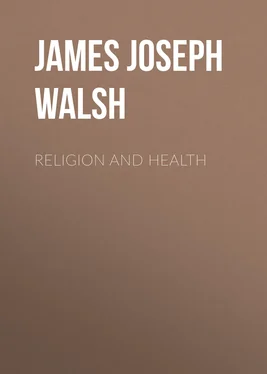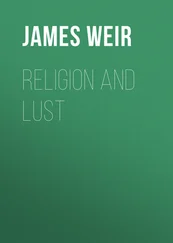James Walsh - Religion And Health
Здесь есть возможность читать онлайн «James Walsh - Religion And Health» — ознакомительный отрывок электронной книги совершенно бесплатно, а после прочтения отрывка купить полную версию. В некоторых случаях можно слушать аудио, скачать через торрент в формате fb2 и присутствует краткое содержание. Жанр: foreign_prose, foreign_religion, Здоровье, foreign_antique, на английском языке. Описание произведения, (предисловие) а так же отзывы посетителей доступны на портале библиотеки ЛибКат.
- Название:Religion And Health
- Автор:
- Жанр:
- Год:неизвестен
- ISBN:нет данных
- Рейтинг книги:4 / 5. Голосов: 1
-
Избранное:Добавить в избранное
- Отзывы:
-
Ваша оценка:
- 80
- 1
- 2
- 3
- 4
- 5
Religion And Health: краткое содержание, описание и аннотация
Предлагаем к чтению аннотацию, описание, краткое содержание или предисловие (зависит от того, что написал сам автор книги «Religion And Health»). Если вы не нашли необходимую информацию о книге — напишите в комментариях, мы постараемся отыскать её.
Religion And Health — читать онлайн ознакомительный отрывок
Ниже представлен текст книги, разбитый по страницам. Система сохранения места последней прочитанной страницы, позволяет с удобством читать онлайн бесплатно книгу «Religion And Health», без необходимости каждый раз заново искать на чём Вы остановились. Поставьте закладку, и сможете в любой момент перейти на страницу, на которой закончили чтение.
Интервал:
Закладка:
Of course the clergymen scientists have been men of prayer, but few people realize how many of them have made distinguished contributions to the domain of science. Poggendorf's "Biographical Lexicon" contains the names of nearly a thousand clergymen who have made such contributions to science as deserve that their fame should be thus enshrined among the scientists of history. One of the greatest astronomers of the nineteenth century was Father Secchi, a Jesuit, some of whose work was done for a time in America. Among the most distinguished names in modern science are Abbé Breuil and Father Obermaier, who have taught the world so much about the cave man. Both of them are well known for their faithful performance of their religious duties in the midst of their scientific work.
Raising up the heart and mind in the midst of work, instead of increasing distractions, rather helps to control them. Distractions will come and may prove seriously wasteful of time, but are caught in the habit of lifting up the mind occasionally, and then the original work is taken up with renewed energy. Above all, such a habit of prayer keeps people from getting into a state of irritable haste about their work in which they consume a lot of energy without getting much done and wear out their nervous systems by the feeling of nervousness that comes over them. To do anything under a sense of pressure is nearly always to disturb the best efforts of the mind and skimp the work. Doing things in this way leads to that bane of modern existence, nervous breakdown, which has become ever so much commoner since men forgot that it is not labor for ourselves that counts so much as labor for others, and that an over-anxiety to get things done for selfish reasons burns up nervous energy faster than anything else. Fussy, irritable effort to work gets on the nerves sooner than any amount of calm effort would. Prayer as I have described would be the cure for it. St. Theresa's well-known prayer is the antidote. 3 3 Let nothing disturb thee, Let nothing affright thee, All things are passing, God never changeth. Who God possesseth In nothing is wanting. Alone God sufficeth. (Longfellow translation.)
When the life of the late Cardinal Vaughan of London appeared, one of the most surprising things in it was the story of the distinguished English Cardinal's habit of prayer. Almost needless to say he was an extremely busy man. Important problems in the administration of his immense archdiocese and in the relationship of the English Catholics to their fellow citizens came before him every day. He had to carry the heavy burden of responsibility and make his decisions promptly and thoroughly, for a great many details necessarily devolved on him. Somehow he found time for hours of prayer during the day, and those who knew him best felt sure he would have declared that so far from distracting him in his work or taking time from it in any real sense of the word, it would have been quite impossible for him to accomplish all he did without this habit of prayer. It was this which enabled him to keep a placid mind and make his decisions easily and firmly in the midst of his work. He himself would undoubtedly have added that he felt he actually derived help from the Infinite through prayer, which enabled him to do his work ever so much better than would have been possible by his own unaided effort. There have been many others, and not a few of them who were not churchmen, who have felt this same way even in our strenuous times.
A whole series of the generals in command of important departments of the French army were men who never let a day pass without prayer and who often raised their hearts and minds up to the Power above them for help in their work and also for resignation that the will of the Most High might be accomplished. General Pau, for instance, was one of these. When, during the war, he was presented with flowers by the children of villages through which he passed, he would say, "These must be for the altar," and then he would ask the children to pray for the success of the French army and would insist that for victory "we must pray very much." General de Castelnau was another of these men who found a resource and a real help in prayer. He felt that the prayers of others helped him. That is the index of real recognition of the value of prayer. "I beg you to implore Him especially to give me light and courage; there is no position where one is more completely in His hands than that which I hold." He wrote to Monsignor Ricard, Archbishop of Auch, "More than ever I find by experience the all-importance in war, as elsewhere, of the 'imponderables' and these 'imponderables' are manifestly in His hands Who knows all and guides all."
We might go on with such examples. For instance, Marshal Pétain, who at the end of the war was in command of the French troops, was another of these strong men of prayer. Earlier in the Great War he had been in command at Verdun, transferred there just as it seemed almost impossible to believe that the Germans could be kept from taking the place. The words of his first order issued the day of his arrival—"They shall not pass"—show the character of the man. He was almost reckless in his bravery when it was necessary to impress his troops with the need to go on, no matter what it cost. Alone and on foot he led his troops under a rain of German shells at Saint Bon; after that he could ask anything of his men. General Gouraud, whose masterly defense of the Allied line when the Germans made their great final unsuccessful attack stamps him as one of the greatest military leaders of the day, had been wounded a number of times before this, but refused to give up, and when, early in the war, one of his arms had to be amputated and the surgeons were afraid that he would object, he said very simply, "Go on, if you think it necessary; I offer it to God for France." His recovery from his several wounds at that time seemed almost impossible, so in gratitude for it he hung an ex-voto in white marble at the shrine of Our Lady of Victories in Paris. General Fayolle is another striking example of prayerfulness in a practical man. He had intended to spend a year of his retirement, which came just before the war opened, in following the footsteps of St. Paul's missionary voyages. He offered himself for service and proved a great leader, yet a simple, kindly man whom his soldiers called Père Fayolle. A letter of his directed to the Mayor of Mainz showed very clearly that while he remembered and realized all the cruelty of the German occupation of Belgium and France, there was no fear of reprisals from the French, just though they might be. He is a man of deep knowledge of his religion as well as of firm piety, and he is famous for his matter-of-fact common sense. He has all the qualities which some people, because they have had so little experience in the matter, assume are not to be found in a man who believes thoroughly in and practices prayer.
A good deal has been said in recent years about the practice of "going into the silence" and finding there renewal of self. Like so many other new modes of expression, this is merely a new formula for that very old religious custom, meditation, and some of the old writers on spiritual subjects, not only generations ago but actually many hundreds of years before modern history began, laid down the rules for it rather carefully. Meditation can be a source of some of the most valuable suggestive, helpful consolation as well as profound enlightenment in difficult problems that human nature has. Above all it generates a calm that makes for peace of mind and, therefore, health of body. John Boyle O'Reilly recognized its deeper meanings a generation ago when he wrote:
"The infinite always is silent:
It is only the finite that speaks.
Our words are the idle wave-caps
On the deep that never breaks.
We may question with wand of science,
Explain, decide, and discuss;
But only in meditation
The Mystery speaks to us."
Интервал:
Закладка:
Похожие книги на «Religion And Health»
Представляем Вашему вниманию похожие книги на «Religion And Health» списком для выбора. Мы отобрали схожую по названию и смыслу литературу в надежде предоставить читателям больше вариантов отыскать новые, интересные, ещё непрочитанные произведения.
Обсуждение, отзывы о книге «Religion And Health» и просто собственные мнения читателей. Оставьте ваши комментарии, напишите, что Вы думаете о произведении, его смысле или главных героях. Укажите что конкретно понравилось, а что нет, и почему Вы так считаете.












